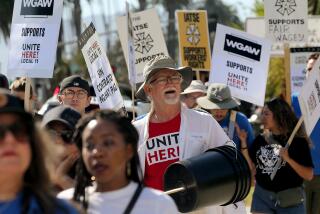Port Idled by Dockworkers’ 1-Day Sympathy Strike
Dockworkers in Port Hueneme joined a worldwide strike Monday that shut down ports from Los Angeles to Seattle for one day in a show of support for striking longshoremen in Liverpool, England.
The strike idled about 40 longshoremen at the Port of Hueneme--the largest commercial port between Los Angeles and San Francisco--and forced a 488-foot cargo vessel delivering bananas and melons to moor outside the harbor until this morning. Drivers of tractor-trailers made what turned out to be literally fruitless trips to the port and were turned away at the gate.
“It’s a ghost town,” said Sgt. Ken Dobbe of the Port Hueneme Police Department as he patrolled the usually bustling docks with only sea gulls for company.
The daytime work stoppage will result in millions of dollars in extra fees for steamship lines on the West Coast but is likely to have only a minimal effect on the delivery of goods.
“Our customers suffer because we’re not able to give the customers the fruit when they want it,” said Kevin Lee, port manager for the Del Monte terminal, which supplies the West Coast of the United States and Canada with bananas and melons from its 30,000-square-foot warehouse.
He estimated that as many as 50 customers were unable to pick up fruit Monday.
The Diamond Reefer cargo vessel, which traveled from Costa Rica, will be unloaded beginning this morning in two days instead of the usual three by hiring additional workers, Lee said.
His seven-person office staff spent Monday catching up on paperwork and taking long lunches, while the approximately 20 crew members aboard the cargo ship were “probably fishing,” he said.
Union dockworkers in Liverpool, one of England’s major ports, have been on strike since September 1995, when the company that operates the harbor fired 330 workers who refused to cross a picket line, said local union members. Those workers were replaced with nonunion labor, but the company is still in settlement talks.
Raymond Fosse, a member of the Oxnard Harbor District Board of Commissioners, which oversees the Port of Hueneme, had little sympathy for the sympathy strike by local workers for their union brothers in England.
“It’s a pretty strange connection as far as I’m concerned,” he said. “It’s bad for the port, but it was minimized by it being a particularly slow day. . . . It will not cost us money, but it will cost our customers money and therefore what’s bad for them is bad for us.”
Board President Jess Ramirez, who is also a longshoreman, had a different view.
“I realize this issue is in Liverpool, England, but what happened in England could easily happen in this country,” he said, adding he did not see a conflict between his role as an elected official and a striking worker. “We have to show our solidarity as blue-collar workers.”
*
International Longshoremen’s and Warehousemen’s Union Local 46, which represents dockworkers in Ventura County, has more than 100 full-time and 300 part-time members.
At the Los Angeles-Long Beach harbor complex, the nation’s busiest, 33 ships were either stranded in berths with no one to handle their cargo or were anchored in the San Pedro Bay with nowhere to go.
By staying away from the job on a paid holiday, when activity at the port complex is typically down at least 25% to 30% anyway, the workers also collectively sacrificed millions of dollars of their own pay to demonstrate unity with the British longshoremen. Officials from the Pacific Maritime Assn., which represents terminals and steamship companies in labor talks, could not be reached for comment Monday, but had estimated during a one-day job action in 1995 that the union gave up $4.5 million in wages.
“We don’t consider it a sacrifice,” said one tractor driver from ILWU Local 13 in Wilmington, the union’s largest. “We don’t mind giving up days for good causes. We’ve got to stick together.”
The San Francisco-based union, with about 8,500 West Coast members, did not return phone calls seeking comment, but said in a memo earlier this month that the Liverpool labor dispute represents a “relentless global offensive to increase profits at the expense of working people.”
Monday’s work stoppage was coordinated by the International Transport Workers Federation, a global consortium of unions. It was the first time the powerful ILWU, which has historically taken the lead in a number of political causes, exercised its muscle to support the Liverpool workers. Critics suggested they were embarrassingly late in this instance.
“I think they’ve got to do something to save face,” said William E. Coday, the retired chairman of the Pacific Maritime Assn. “They had painted themselves as the most liberal union. They, more than anyone else, had to do something because they adopted that mantle.”
*
Monday’s job action could also signal more rough seas in the union’s tumultuous relationship with its employers. Members of the union have been unhappy with their new contract since it took effect Oct. 26, and for the last three months ports up and down the West Coast have reported sporadic work slowdowns that cut productivity by as much as 30%, according to the maritime association.
Although the new three-year pact would increase the base wage of most longshoremen $2 this year to $24.68 an hour, it eliminated lucrative side deals between employers and individual union members, particularly crane operators.
And at other West Coast ports, such as Portland, Ore., officials reported labor slowdowns apparently led by clerks who wanted to be included in a higher wage category.
Word of Monday’s planned work stoppage had spread throughout the industry, and steamship companies said they had taken steps to avert a major loss of time and money. In some cases, vessels heading from the Asian ports to the U.S. slowed down so they would not be caught at the docks with no labor. Others accelerated their ships last week to arrive and depart from West Coast ports by Monday morning.
“It’s cheaper to be at sea than to come here,” said Gunnar Gose, transportation manager for Kawasaki Kisen Kaisha Ltd., or K-Line, whose massive vessel Newport Bridge was idled at the Long Beach port Monday.
Others said they would employ extra dockworkers and utilize additional cranes to handle more cargo and make up for lost time on the next shift.
“When you lose a day, it just jams up everything else,” said Ray Keene, chief operating officer for Mitsui OSK Lines, which sped one of its ships ahead of schedule into the Seattle harbor to escape delays Monday. “We can make it up, but we have to steam that much faster, and fuel consumption rises quickly.”
Leeds is a Times staff writer; Green is a Times correspondent.
More to Read
Sign up for Essential California
The most important California stories and recommendations in your inbox every morning.
You may occasionally receive promotional content from the Los Angeles Times.






